May 20, 2025 | 16:37 GMT +7
May 20, 2025 | 16:37 GMT +7
Hotline: 0913.378.918
May 20, 2025 | 16:37 GMT +7
Hotline: 0913.378.918
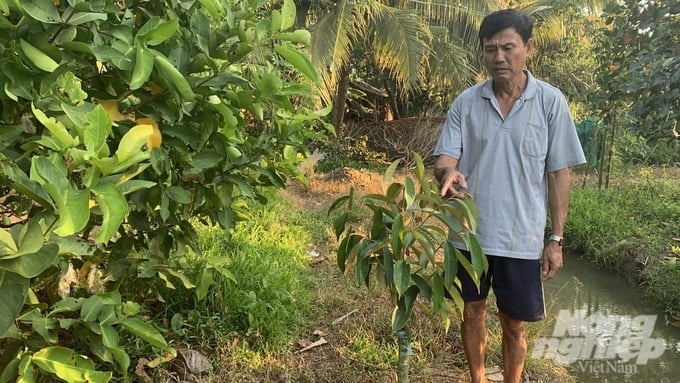
Mr. Nguyen Trung Bang said that since there were sluices to prevent salinity, people planted fruit trees such as durian, mangosteen, rambutan, seedless lemon, and Thai jackfruit and improved income. Photo: Ho Thao.
Tra Vinh, a province in the Mekong Delta, bears the brunt of climate change. It particularly grapples with drought and saltwater intrusion during the dry season, which leaves numerous agricultural regions parched for irrigation.
Mr. Nguyen Trung Bang from Giong Noi hamlet, Tam Ngai commune, Cau Ke district, vividly recalls the devastation wrought during the dry season of 2016, when saltwater inundated the fields, leaving nearly all the rice paddies in his village damaged. Subsequently, every year during March and April (in the lunar calendar), as the monsoon season approaches, anxiety grips Giong Noi village, fearing the incursion of seawater and its adverse impact on crops.
"By 2020, with the State's commissioning of the Tan Dinh and Bong Bot sluices, our anxieties were assuaged. During the dry season, the gates of these sluices remain shut, preventing saltwater penetration deep into our lands. Consequently, people boldly transitioned from rice cultivation to planting fruit trees, leading to significant livelihood improvements," Mr. Bang revealed.
According to Mr. Pham Van Kha, Deputy Director of the Department of Agriculture and Rural Development in Cau Ke district, amid the current complexity of saltwater intrusion, the Bong Bot and Tan Dinh sluice projects, located in An Phu Tan commune, have proven instrumental. Initiated by the Ministry of Agriculture and Rural Development and operational from 2020, these projects demonstrate remarkable efficacy in salinity prevention and freshwater storage.
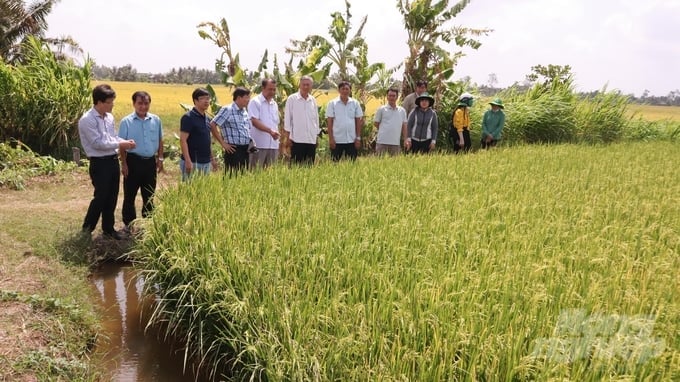
Farmers' fields are in the ripening stage in Tra Vinh, and the seeds are provided sufficient water. Photo: Ho Thao.
In this year's dry season, the Bong Bot - Tan Dinh sluice has been in operation, ensuring water supply for 13,000 hectares of fruit orchards and nearly 4,000 hectares of rice fields belonging to local residents, as well as numerous orchards and rice paddies in Tra On district, Mang Thit, Vinh Long province.
In Tra Cu district, home to a Khmer ethnic community comprising over 30% of the population, most sustain themselves through rice cultivation. Previously, during the dry season, farmers grappled with water scarcity. The memory of the severe drought and salinity during the 2019-2020 dry season still haunts the locals. Salinity alone inflicted an estimated loss of approximately 1,000 billion VND in the province, with rice crops bearing the brunt of the damage, amounting to 919 billion VND. Additionally, dozens of hectares of crops and over 271 hectares of fruit trees suffered damage. The drought and saltwater intrusion during the 2019-2020 dry season also led to thousands of rural households facing domestic water scarcity.
Mr. Thach Sa Nat, residing in Dau Giong B hamlet, Phuoc Hung commune, Tra Cu district, vividly recalls the ordeal of that year. Sea water infiltrated deep into the fields, leaving a salty taste lingering in his mouth. The saltwater rendered the young rice plants limp, withering their stems and scorching their leaves to a crisp. Ultimately, the crops perished, leaving the family with no choice but to utilize them as fodder for their cattle. Some found the rice too salty to consume, spitting it in distaste.
According to Mr. Sa Nat, the State's operation of the Bong Bot - Tan Dinh sluice, facilitating the influx of water into the inland canal via the 3/2 pumping station, has significantly enhanced local production. Winter rice yields have consistently surpassed previous years, with this year's harvest remaining unaffected by salinity. The grains are plump, the stalks robust, yielding 7.5 tons per hectare, fetching a price of 8,500 VND per kilogram. After deducting all expenses, Mr. Sa Nat still pockets a profit of over 35 million VND per hectare.
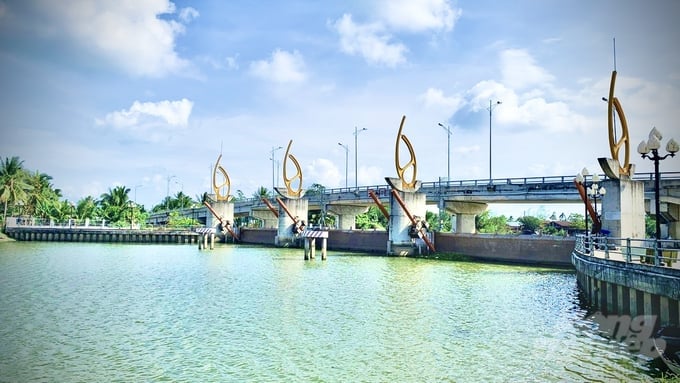
Bong Bot sewer and Tan Dinh sewer in An Phu Tan commune, Cau Ke district, Tra Vinh province are two key sewers to collect water to serve the coastal area of Tra Vinh province through the Canal 3/2 pumping station. Photo: Ho Thao.
Mr. Le Phuoc Dung, Director of Tra Vinh Irrigation Project Management and Operation Company Limited – the entity overseeing the sluice and pumping station operation – explained that the 3/2 pumping station is currently operational. It draws water from the Tan Dinh - Bong Bot sluice in the Cau Ke district, pumping freshwater to nourish the winter-spring rice cultivation areas of the Tra Cu district, as well as parts of Chau Thanh, Cau Ngang, and Duyen Hai districts. This supply of water adequately caters to nearly 26,000 hectares of productive land, supporting thousands of households.
"At the primary culvert, our staff maintains round-the-clock vigilance, monitoring salinity levels twice daily. When salinity drops below 1‰, we open the sluice gates to collect water for storage. Conversely, if salinity exceeds 1‰, we promptly close the gates to prevent saltwater intrusion," Mr. Dung emphasized.
Mr. Le Quang Rang, Deputy Director of the Tra Vinh Department of Agriculture and Rural Development, affirms that the province has seen no freshwater shortage entering the central canal as in previous years. Overall, agricultural production areas are experiencing fewer impacts from water scarcity and salinity threats in inland regions.
Since the onset of the dry season, the agricultural sector has formulated specific response plans and scenarios. Simultaneously, it has collaborated with local authorities to disseminate information and mobilize communities to adhere to seasonal planting schedules, practice water conservation, and adopt appropriate farming techniques amidst drought and salinity conditions. Furthermore, efforts have been made to store freshwater to sustain production when salinity permeates deep into fields, rendering primary culverts unable to receive freshwater.
Moreover, irrigation projects such as the Bong Bot and Tan Dinh sluices have effectively prevented salinity intrusion and stored freshwater to support livelihoods.
However, during dry periods (from January to May annually), supplying freshwater to downstream areas of the Hau River poses challenges. A significant volume of water from the Bong Bot and Tan Dinh sewers, channeled through the Tra Ngoa and Tong canals to serve the Cau Ke, Tieu Can, and Cang Long districts, is lost due to backflow along the Nga Hau canal towards Vinh Long.
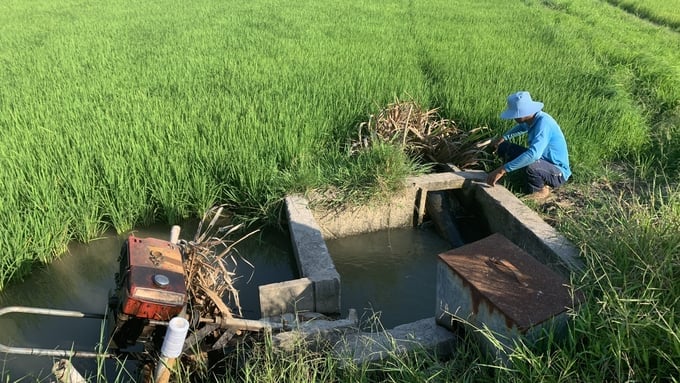
A farmer in Tra Vinh is pumping water into the rice field, the water source from the in-field canal is still guaranteed. Photo: Ho Thao.
"The province has proposed to the Ministry of Agriculture and Rural Development to invest in a sewer system in the Nga Hau area (adjacent to the Tra Ngoa canal, Tan An commune, Cang Long district). This project aims to prevent the diversion of freshwater towards Mang Thit (Vinh Long) and facilitate the provision of freshwater to downstream areas of the Hau River (along the coast), such as Tra Cu, Cau Ngang, and Duyen Hai, through a conveyor pump system," Mr. Rang elucidated.
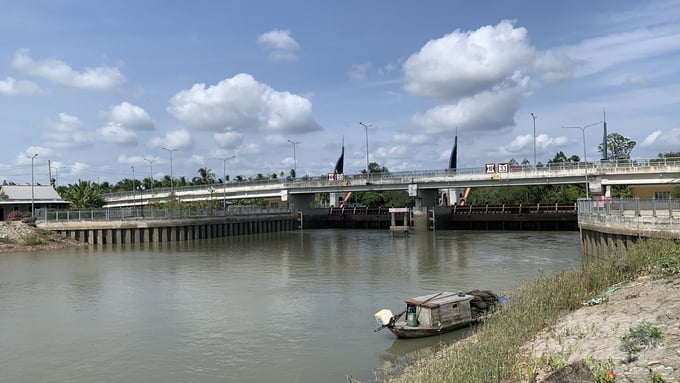
Along with Bong Bot sewer, Tan Dinh sewer is operating directly to protect thousands of hectares of fruit trees and crops of farmers in Tra Vinh province. Photo: Ho Thao.
The Tan Dinh and Bong Bot sluices, integral components of the water source control and climate change adaptation sub-project in the Nam Mang Thit region, were inaugurated in An Phu Tan commune, Cau Ke district, in January 2020. Since their commencement, these sluices have effectively curbed saltwater intrusion into inland fields, ensuring an adequate water supply during the dry season and safeguarding rice paddies, crops, and edible plants, much to the delight of local residents.
Mr. Le Van Han, Chairman of the Tra Vinh Provincial People's Committee, emphasizes that while salinity intrusion remains a complex issue, it is being effectively managed due to proactive measures implemented by the province from the onset of the dry season. Additionally, irrigation projects invested by both the Ministry of Agriculture and Rural Development and the provincial government have played a crucial role in regulating water supply to support agricultural production.
Translated by Quynh Chi

(VAN) Japan's grant aid project contributes to capacity building, promoting organic agricultural production, and fostering sustainable community development in Dong Thap province.

(VAN) For years, the CRISPR-Cas9 genome technology has been reshaping genetic engineering, a precision tool to transform everything from agriculture to medicine.

(VAN) Vietnam aims to become a 'leader' in the region in the capacity and managing effectively soil health and crop nutrition.
![Reducing emissions from rice fields: [Part 1] Farming clean rice together](https://t.ex-cdn.com/nongnghiepmoitruong.vn/608w/files/news/2025/05/05/z6509661417740_a647202949c539012a959e841c03e1d3-nongnghiep-143611.jpg)
(VAN) Growing clean rice helps reduce environmental pollution while increasing income, allowing farmers to feel secure in production and remain committed to their fields for the long term.
/2025/05/19/5136-1-144800_230.jpg)
(VAN) The Nghe An Provincial People's Committee has just approved the list of beneficiaries eligible for revenue from the Emission Reductions Payment Agreement (ERPA) in the North Central region for the year 2025.

(VAN) 14 out of 35 domesticated elephants in Dak Lak province have had their living conditions improved, with 11 of them currently participating in the non-riding elephant tourism model.

(VAN) Muong Nhe Nature Reserve hopes that being upgraded to a national park will lay the foundation for forest protection efforts to be carried out in a systematic, modern, and sustainable manner.